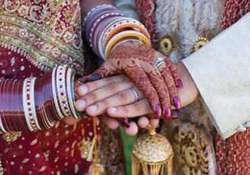Tribal tradition breaks, woman weds dead partner's body
Patna/Ranchi, Oct 13: Santhal tribals in a Bihar village have added a new chapter to their ancient custom of young men and women living together - allowing an unwed mother to marry her dead partner's

Patna/Ranchi, Oct 13: Santhal tribals in a Bihar village have added a new chapter to their ancient custom of young men and women living together - allowing an unwed mother to marry her dead partner's body to make her children legitimate and give them property rights.
Chudki Hembram, who was in a live-in relationship with one Mahalal Marandi, faced a harsh future after her partner died of illness last week for want of proper medical facilities.
Sensing Chudki's plight, the elders of her community stepped in and broke a long tradition.
"Before Mahalal died, they were living happily as a couple according to our tradition of 'Gotul'. But when he died, we decided that Chudki should marry him before the cremation to provide her relationship legitimacy and get her four children the name of a father," said Shyamlal Tudu, the headman of Jaitapur village in Banka district bordering Jharkhand.
He said Mahalal's lifeless fingers was used to put red vermillion on Chudki's forehead to solemnise the marriage and make her his wife.
Later, the community elders asked the red mark to be erased and declared Chudki a widow.
"In our tribe, this was the first marriage solemnised after the death of a partner," Tudu said.
He said they were forced to change Gotul to accommodate today's realities.
Gotul -- practised in the tribal regions of Bihar and Jharkhand -- allows young adults to cohabit till they are sure the partner he or she has chosen is good enough for marriage.
Chudki too, at an early age, started living with Mahalal 10 years ago. But they failed to marry because of extreme poverty since they did not have enough money to hold a wedding feast, said Tudu.
Sadly, the feast was indeed held but after Chuki's marriage and immediate widowhood.
Tudu said Chudki could now stake claim to a small plot her husband left behind. Their children too would not be called illegitimate any more.
Chudki's father Chabbu Hembrom thanked the villagers for agreeing to change the tradition to help her daughter and her children.
Kanchan Bala, an activist here, said it was a good move on the part of the community to change the tradition.
"It is going to help a young unwed woman with children to live a life in peace after the death of her partner," she said.
However, Prakash Chandra Oran, an expert on tribal customs, said there was nothing new in the practice.
"It is something new and rare only for non-tribals," Oran told IANS from Ranchi in Jharkhand.
A.K. Jha, a researcher at the A.N. Sinha Institute of Social Studies in Patna, said social acceptance of the young woman's marriage with her dead partner showed the flexibility of tribal society.
Chudki Hembram, who was in a live-in relationship with one Mahalal Marandi, faced a harsh future after her partner died of illness last week for want of proper medical facilities.
Sensing Chudki's plight, the elders of her community stepped in and broke a long tradition.
"Before Mahalal died, they were living happily as a couple according to our tradition of 'Gotul'. But when he died, we decided that Chudki should marry him before the cremation to provide her relationship legitimacy and get her four children the name of a father," said Shyamlal Tudu, the headman of Jaitapur village in Banka district bordering Jharkhand.
He said Mahalal's lifeless fingers was used to put red vermillion on Chudki's forehead to solemnise the marriage and make her his wife.
Later, the community elders asked the red mark to be erased and declared Chudki a widow.
"In our tribe, this was the first marriage solemnised after the death of a partner," Tudu said.
He said they were forced to change Gotul to accommodate today's realities.
Gotul -- practised in the tribal regions of Bihar and Jharkhand -- allows young adults to cohabit till they are sure the partner he or she has chosen is good enough for marriage.
Chudki too, at an early age, started living with Mahalal 10 years ago. But they failed to marry because of extreme poverty since they did not have enough money to hold a wedding feast, said Tudu.
Sadly, the feast was indeed held but after Chuki's marriage and immediate widowhood.
Tudu said Chudki could now stake claim to a small plot her husband left behind. Their children too would not be called illegitimate any more.
Chudki's father Chabbu Hembrom thanked the villagers for agreeing to change the tradition to help her daughter and her children.
Kanchan Bala, an activist here, said it was a good move on the part of the community to change the tradition.
"It is going to help a young unwed woman with children to live a life in peace after the death of her partner," she said.
However, Prakash Chandra Oran, an expert on tribal customs, said there was nothing new in the practice.
"It is something new and rare only for non-tribals," Oran told IANS from Ranchi in Jharkhand.
A.K. Jha, a researcher at the A.N. Sinha Institute of Social Studies in Patna, said social acceptance of the young woman's marriage with her dead partner showed the flexibility of tribal society.